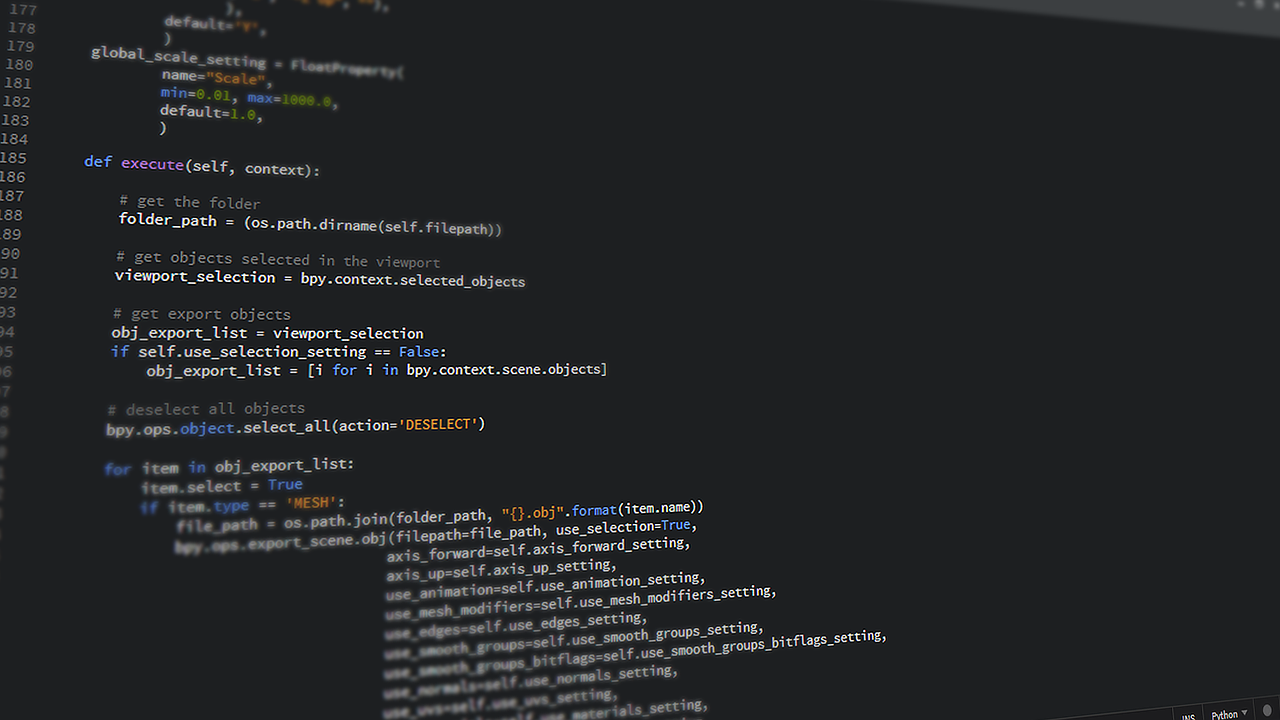Non-offcial Python implementations are another important thing to learn by Python programmers. Learn all you need to know about this module here.
IronPython
Open-source implementation for .NET and Mono written in C#, licensed under Apache License 2.0. It relies on DLR (Dynamic Language Runtime). It supports only version 2.7, version 3 is currently being developed.
Differences with CPython:
- Tight integration with .NET Framework.
- Strings are Unicode by default.
- Does not support extensions for CPython written in C.
- Does not suffer from Global Interpreter Lock.
- Performance is usually lower, though it depends on tests.
Hello World
print "Hello World!"
You can also use .NET functions:
import clr
from System import Console
Console.WriteLine("Hello World!")
External links
Official website
GitHub repository
Non-offcial Python implementations: Jython
Open-source implementation for JVM written in Java, licensed under Python Software Foundation License. It supports only version 2.7, version 3 is currently being developed.
Differences with CPython:
- Tight integration with JVM.
- Strings are Unicode.
- Does not support extensions for CPython written in C.
- Does not suffer from Global Interpreter Lock.
- Performance is usually lower, though it depends on tests.
Hello World
print "Hello World!"
You can also use Java functions:
from java.lang import System
System.out.println("Hello World!")
External links
Official website
Mercurial repository
Non-offcial Python implementations: Transcrypt
Transcrypt is a tool to precompile a fairly extensive subset of Python into compact, readable Javascript. It has the following characteristics:
Allows for classical OO programming with multiple inheritance using pure Python syntax, parsed by CPython’s native parser
Seamless integration with the universe of high-quality web-oriented JavaScript libraries, rather than the desktop-oriented Python ones
Hierarchical URL based module system allowing module distribution via PyPi
Simple relation between Python source and generated JavaScript code for easy debugging
Multi-level sourcemaps and optional annotation of target code with source references
Compact downloads, kB’s rather than MB’s
Optimized JavaScript code, using memoization (call caching) to optionally bypass the prototype lookup chain Operator overloading can be switched on and off locally to facilitate readable numerical math
Code size and speed
Experience has shown that 650 kB of Python sourcecode roughly translates in the same amount of JavaScript source code. The speed matches the speed of handwritten JavaScript and can surpass it if call memoizing is switched on.
Integration with HTML
Hello demo
…
Click me repeatedly!
...
And click me repeatedly too!
Integration with JavaScript and DOM
from itertools import chain
class SolarSystem:
planets = [list (chain (planet, (index + 1,))) for index, planet in enumerate (( ('Mercury', 'hot', 2240),
('Venus', 'sulphurous', 6052),
('Earth', 'fertile', 6378),
('Mars', 'reddish', 3397),
('Jupiter', 'stormy', 71492),
('Saturn', 'ringed', 60268),
('Uranus', 'cold', 25559),
('Neptune', 'very cold', 24766)
))]
lines = (
'{} is a {} planet',
'The radius of {} is {} km',
'{} is planet nr. {} counting from the sun'
)
def init (self):
self.lineIndex = 0
def greet (self):
self.planet = self.planets [int (Math.random () * len (self.planets))]
document.getElementById ('greet') .innerHTML = 'Hello {}'.format (self.planet [0])
self.explain ()
def explain (self):
document.getElementById ('explain').innerHTML = (
self.lines [self.lineIndex] .format (self.planet [0], self.planet [self.lineIndex + 1])
)
self.lineIndex = (self.lineIndex + 1) % 3
solarSystem = SolarSystem ()
Integration with other JavaScript libraries
Transcrypt can be used in combination with any JavaScript library without special measures or syntax. In the documentation examples are given for a.o. react.js, riot.js, fabric.js and node.js.
Relation between Python and JavaScript code
Python
class A:
def init (self, x):
self.x = x
def show (self, label):
print ('A.show', label, self.x)
class B:
def init (self, y):
alert ('In B constructor')
self.y = y
def show (self, label):
print ('B.show', label, self.y)
class C (A, B):
def init (self, x, y):
alert ('In C constructor')
A.init (self, x)
B.init (self, y)
self.show ('constructor')
def show (self, label):
B.show (self, label)
print ('C.show', label, self.x, self.y)
a = A (1001)
a.show ('america')
b = B (2002)
b.show ('russia')
c = C (3003, 4004)
c.show ('netherlands')
show2 = c.show
show2 ('copy')
JavaScript
var A = class ('A', [object], {
get init () {return get (this, function (self, x) { self.x = x;
});},
get show () {return get (this, function (self, label) { print ('A.show', label, self.x);
});}
});
var B = class ('B', [object], {
get init () {return get (this, function (self, y) { alert ('In B constructor');
self.y = y;
});},
get show () {return get (this, function (self, label) { print ('B.show', label, self.y);
});}
});
var C = class ('C', [A, B], {
get init () {return get (this, function (self, x, y) { alert ('In C constructor');
A.init (self, x);
B.init (self, y);
self.show ('constructor');
});},
get show () {return get (this, function (self, label) { B.show (self, label);
print ('C.show', label, self.x, self.y);
});}
});
var a = A (1001);
a.show ('america');
var b = B (2002);
b.show ('russia');
var c = C (3003, 4004);
c.show ('netherlands');
var show2 = c.show;
show2 ('copy');
External links
Official website: https://www.transcrypt.org/
Repository: https://github.com/JdeH/Transcrypt

